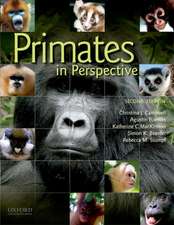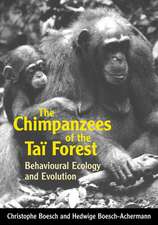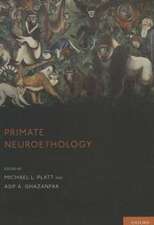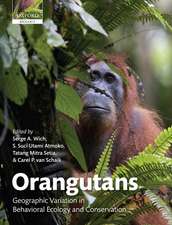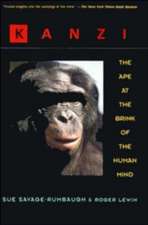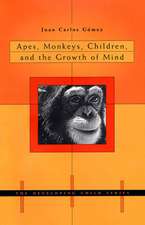Primate Craniofacial Function and Biology: Developments in Primatology: Progress and Prospects
Editat de Chris Vinyard, Matthew J. Ravosa, Christine Wallen Limba Engleză Hardback – 25 sep 2008
Additionally, the volume includes introductory chapters discussing how primatologists study adaptations in primates and a discussion of in vivo approaches for studying primate performance. At present, there are no texts with a similar focus on primate craniofacial biology and no sources that approach this topic from such a wide range of research perspectives. This breadth of research covered by leaders in their respective fields make this volume a unique and innovative contribution to biological anthropology.
| Toate formatele și edițiile | Preț | Express |
|---|---|---|
| Paperback (1) | 1227.52 lei 6-8 săpt. | |
| Springer Us – 31 oct 2014 | 1227.52 lei 6-8 săpt. | |
| Hardback (1) | 1231.47 lei 6-8 săpt. | |
| Springer Us – 25 sep 2008 | 1231.47 lei 6-8 săpt. |
Din seria Developments in Primatology: Progress and Prospects
- 20%
 Preț: 571.31 lei
Preț: 571.31 lei - 18%
 Preț: 1216.65 lei
Preț: 1216.65 lei - 19%
 Preț: 578.66 lei
Preț: 578.66 lei - 18%
 Preț: 956.69 lei
Preț: 956.69 lei - 18%
 Preț: 948.92 lei
Preț: 948.92 lei - 18%
 Preț: 948.92 lei
Preț: 948.92 lei - 18%
 Preț: 945.79 lei
Preț: 945.79 lei - 18%
 Preț: 962.66 lei
Preț: 962.66 lei - 18%
 Preț: 1664.43 lei
Preț: 1664.43 lei - 18%
 Preț: 1224.54 lei
Preț: 1224.54 lei - 24%
 Preț: 826.25 lei
Preț: 826.25 lei - 24%
 Preț: 802.74 lei
Preț: 802.74 lei - 18%
 Preț: 1562.94 lei
Preț: 1562.94 lei - 18%
 Preț: 950.21 lei
Preț: 950.21 lei - 18%
 Preț: 943.73 lei
Preț: 943.73 lei - 18%
 Preț: 1549.67 lei
Preț: 1549.67 lei - 18%
 Preț: 1248.20 lei
Preț: 1248.20 lei - 18%
 Preț: 941.38 lei
Preț: 941.38 lei - 24%
 Preț: 800.85 lei
Preț: 800.85 lei - 18%
 Preț: 953.35 lei
Preț: 953.35 lei - 18%
 Preț: 1827.48 lei
Preț: 1827.48 lei - 18%
 Preț: 1214.90 lei
Preț: 1214.90 lei - 18%
 Preț: 957.62 lei
Preț: 957.62 lei - 18%
 Preț: 1225.48 lei
Preț: 1225.48 lei - 5%
 Preț: 1433.83 lei
Preț: 1433.83 lei - 18%
 Preț: 1231.16 lei
Preț: 1231.16 lei - 18%
 Preț: 1226.90 lei
Preț: 1226.90 lei - 18%
 Preț: 955.25 lei
Preț: 955.25 lei - 18%
 Preț: 956.03 lei
Preț: 956.03 lei - 18%
 Preț: 1218.53 lei
Preț: 1218.53 lei - 18%
 Preț: 950.52 lei
Preț: 950.52 lei -
 Preț: 416.82 lei
Preț: 416.82 lei - 18%
 Preț: 1554.89 lei
Preț: 1554.89 lei
Preț: 1231.47 lei
Preț vechi: 1501.79 lei
-18% Nou
Puncte Express: 1847
Preț estimativ în valută:
235.68€ • 245.40$ • 199.18£
235.68€ • 245.40$ • 199.18£
Carte tipărită la comandă
Livrare economică 11-25 martie
Preluare comenzi: 021 569.72.76
Specificații
ISBN-13: 9780387765846
ISBN-10: 0387765840
Pagini: 496
Ilustrații: XXIV, 496 p.
Dimensiuni: 155 x 235 x 28 mm
Greutate: 0.84 kg
Ediția:2008
Editura: Springer Us
Colecția Springer
Seria Developments in Primatology: Progress and Prospects
Locul publicării:New York, NY, United States
ISBN-10: 0387765840
Pagini: 496
Ilustrații: XXIV, 496 p.
Dimensiuni: 155 x 235 x 28 mm
Greutate: 0.84 kg
Ediția:2008
Editura: Springer Us
Colecția Springer
Seria Developments in Primatology: Progress and Prospects
Locul publicării:New York, NY, United States
Public țintă
ResearchCuprins
Historical Perspective on Experimental Research in Biological Anthropology.- Experimental Comparative Anatomy in Physical Anthropology: The Contributions of Dr. William L. Hylander to Studies of Skull Form and Function.- In Vivo Research into Masticatory Function.- A Nonprimate Model for the Fused Symphysis: In Vivo Studies in the Pig.- Symphyseal Fusion in Selenodont Artiodactyls: New Insights from~In Vivo and Comparative Data.- Does the Primate Face Torque?.- Motor Control of Masticatory Movements in the Southern Hairy-Nosed Wombat (Lasiorhinus latifrons).- Specialization of the Superficial Anterior Temporalis in Baboons for Mastication of Hard Foods.- Modeling Masticatory Apparatus Function.- Effects of Dental Alveoli on the Biomechanical Behavior of the Mandibular Corpus.- Surface Strain on Bone and Sutures in a Monkey Facial Skeleton: An In Vitro Approach and its Relevance to Finite Element Analysis.- Craniofacial Strain Patterns During Premolar Loading: Implications for Human Evolution.- Jaw-Muscle Architecture.- Scaling of Reduced Physiologic Cross-Sectional Area in Primate Muscles of Mastication.- Scaling of the Chewing Muscles in Prosimians.- The Relationship Between Jaw-Muscle Architecture and Feeding Behavior in Primates: Tree-Gouging and Nongouging Gummivorous Callitrichids as a Natural Experiment.- Bone and Dental Morphology.- Relationship Between Three-Dimensional Microstructure and Elastic Properties of Cortical Bone in the Human Mandible and Femur.- Adaptive Plasticity in the Mammalian Masticatory Complex: You AreWhat, and How, You Eat.- Mandibular Corpus Form and Its Functional Significance: Evidence from Marsupials.- Putting Shape to Work: Making Functional Interpretations of~Masticatory Apparatus Shapes in Primates.- Food Physical Properties and TheirRelationship to Morphology: The Curious Case of kily.- Convergence and Frontation in Fayum Anthropoid Orbits.- What Else Is the Tall Mandibular Ramus of the Robust Australopiths Good For?.- Framing the Question: Diet and Evolution in Early Homo.
Recenzii
From the reviews:
"Experimental analysis of functional adaptations of facial and skull form in nonhuman primates often has implications for human evolution as well. William Hylander (Duke Univ.) has been a major player in this arena since the early 1970s, and this volume is based on a 2005 symposium in his honor. … Greater intercitation of chapters would have improved this excellent collection of often-complex papers. Summing Up: Recommended. Graduate students, researchers, and faculty." (E. Delson, Choice, Vol. 46 (8), April, 2009)
"Experimental analysis of functional adaptations of facial and skull form in nonhuman primates often has implications for human evolution as well. William Hylander (Duke Univ.) has been a major player in this arena since the early 1970s, and this volume is based on a 2005 symposium in his honor. … Greater intercitation of chapters would have improved this excellent collection of often-complex papers. Summing Up: Recommended. Graduate students, researchers, and faculty." (E. Delson, Choice, Vol. 46 (8), April, 2009)
Textul de pe ultima copertă
Primates have unusual heads among mammals. Their big brains, relatively short faces and forward-facing eyes are part of a unique combination of traits that have captured the interest of biological anthropologists for decades. Describing the patterns of primate craniofacial evolution as well as sorting out the functional consequences of this evolutionary history has been fundamental in developing our current understanding of primates. Primate Craniofacial Function and Biology surveys current research on primate heads emphasizing the recent progress and diversity of functional studies into primate and mammalian craniofacial form. Much of the work included in this volume was inspired by William L. Hylander and his life-long contribution to research on primate craniofacial form and function.
Caracteristici
All chapters are written by experts currently doing research in fields ranging from developmental biology and genetics to the study of primate diets in remote areas of the world Includes supplementary material: sn.pub/extras

